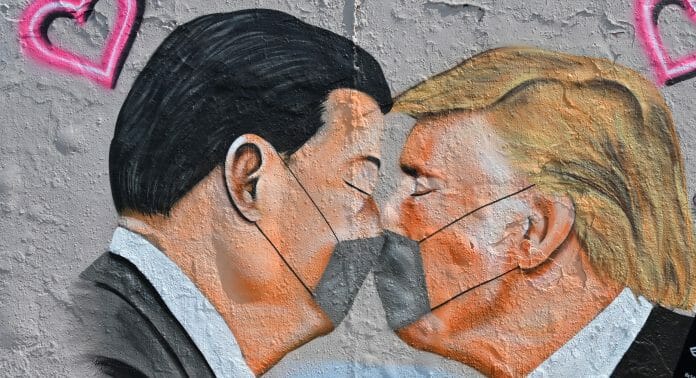By Dr Mohd Afzanizam Abdul Rashid.
As more countries begin to reopen their economy, the trade war between the US and China which has been in hibernation mode for quite some time, has resurfaced again.
Understandably, the death toll from the Covid-19 pandemic in the US is a gruesome fact.
However, this does not permit the blame game to make their rounds as this could bring more harm than good. For starters, the economy is in shamble presently.
The business sentiments are plunging at a speed that we have never seen before. The JP Morgan Global Manufacturing Purchasing Managers’ Index (PMI) fell to 39.8 points in April from 47.3 points previously while more importantly, the New Orders sub index declined to its 22-year history to 31.8 points.
Judging from this, manufacturers would not be in a hurry to ramp up hiring and to expand their capacity. This cannot be good for the economy.
The meteoric rise of China’s economy is undisputed and most of all, unstoppable.
In 1980, China is ranked at 11th place in terms of their economic size relative to the world. Back then, their GDP based on purchasing power parity (PPP) was at USD304 billion.
After the collapse of the communist regime in 1989, China was already the fifth largest economy in 1990, trailing behind Italy and Germany.
During the 2000s, the country commanded second place and in 2019, China is deemed to be the largest economy in the world with GDP of USD27.3 trillion, trailing behind the US.
Despite the sceptics, the country’s economy has accelerated at unprecedented level.
Perhaps, this could be the cause of the friction with the US.
In this respect, Professor Graham Allison, an American political scientist at the John F. Kennedy School of Government at Harvard University has made an interesting observation.
In one of his lectures in 2018, he talked about the nature and impacts of the US and China conflicts and drew parallel on Thucydides Trap.
The Thucydides Trap is an analogy of the Peloponnesian War in ancient Greece which happened more than 2500 years ago.
To quote from the ancient Greek historian, Thucydides, “It was the rise of Athens and the fear that this instilled in Sparta that made war inevitable”.
Essentially, Thucydides Trap is a dangerous dynamics that occurs when the rising power threatening to displace the ruling power.
So in the current context, the rising power is China.
Professor Allison attributed in the past 500 years, there were 16 cases of similar nature whereby the conflict between the rising power and the ruling state resulted in a war. He also said in order to avoid the war, all countries would need to work with each other just like after the World War 2 when major institution such as United Nation, World Bank, IMF and NATO was established to bring order and peace.
The main takeaway from his lecture is that countries across the globe need to cooperate and find the root cause for any conflict.
It may seems a motherhood statement but it is what it is.
The global economy has become so interrelated through the supply chain and to suddenly shock the system by moving all the production facilities from China to the US, it may well could backfire.
The amount of time and money to be invested in order to achieve similar if not better economies of scale relative to China would be surmountable. Corridor talks would say we need the war as this would create implosive demand for raw material, energy and labour.
True enough, the US economy was growing massively in 1941, 1942 and 1943 at 17.7 percent, 18.9 percent and 17.0 percent respectively. However, the turbo charged GDP growth came with a great cost.
A total of 70 to 85 million soul were perished in the World War 2. Indeed, it’s inhumane to think war as a way out for achieving a prosperous economy.
What we need is a good policy on education, healthcare and infrastructure so that the economy can operate almost seamlessly.
The income gap would need to be addressed by ensuring no tax avoidance among the richest and robust mechanism to redistribute the wealth.
International trade should not be done solely on free trade but fair trade instead. That way it allow developing economies to build capacity and be able to compete on a level playing field.
Combating corruption and taking care of environment are also paramount for sustainable growth. The lists can go on.
Having said that, investors would need to be vigilant as we are entering into an unchartered territory.
Situations are very fluid and therefore, investors need to contend with the excessive volatility.
The old mantra diversification, diversification, diversification would never get enough. So stay alert and read up.
Dr Mohd Afzanizam Abdul Rashid is the Chief Economist of Bank Islam Malaysia Berhad










